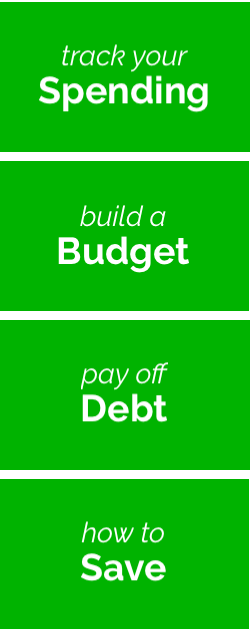3 Ways To Simplify Your Finances
Where do I want to spend my time? Not managing my finances, that’s for sure.
If you spend more than 30-minutes per week managing your finances then you need to simplify! That includes budgeting, paying bills, making debt payments, and moving money around.
Spending a lot of time managing your finances can actually be bad for your net worth. It zaps your energy and leads to bad financial decisions. Spending a lot of time on your finances can lead to budget fatigue and makes it more likely that you’ll make an impulse purchase.
Simplifying your finances doesn’t have to be difficult. It might require a bit of time up-front but once you’ve made a change you’ll immediately start to see the benefits.
Have Just One Bank Account (Preferably No-Fee)
Traditional bank accounts are a pain in the @$$. There are monthly fees and minimum balances to maintain. There are only a certain number of transactions you have each month.
Having just one bank account, preferable a no-fee bank account, makes things much simpler.
With just one no-fee bank account you don’t have to worry about account minimums. You don’t need to worry about the number of transactions you make each month. You don’t have to pay those terrible monthly fees.
We switched to a no-fee bank account about 10 years ago and we’ve probably saved at least $3,000 in monthly fees since then and we never have to worry about keeping a minimum balance.
Use Just One Credit Card
There are a total of 74.3 million credit cards in circulation in Canada! That’s about 2.7 credit cards per adult!
Credit cards are great, don’t get me wrong, but using more than one credit card can complicate your finances. If you use more than one credit card you need to make multiple credit card payments each month. You need to remember the date and the amount and make sure those payments happen on time.
Having multiple credit cards isn’t a problem. I like to have at least one credit card as a backup. Your credit card could get lost, or stolen, or be frozen due to fraud. Having a backup no-fee card is a smart thing to do. But just don’t use it.
Put all your spending on just one credit card, this makes things much simpler (Make things even simpler by getting a credit card from the same bank you use for your checking/savings account, then everything is in one place!)
Don’t Budget, Use An Anti-Budget
My favorite method to budget is called the anti-budget, or the reverse budget. Rather than budgeting money for every spending category, with an anti-budget you just pay yourself first and then spend the rest. Whatever you have left in your checking account is fair game until your next pay day.
Using an anti-budget makes things super simple. It takes very little time. As long as you’re putting money into savings & investments each month the rest can just happen. With an anti-budget you don’t need to budget and you don’t need to track expenses. As long as the first thing you do when you get paid is save/invest, then you’re good to go!
Saving in this case can mean many things. Saving could include fixed monthly payments like rent, utilities, phone and internet, or it could just include emergency savings/long-term savings.
Be warned! An anti-budget isn’t for everyone. An anti-budget great when you already have control over your spending habits, but if you’ve never budgeted before then you might want to start with a traditional budget until you’ve got a good handle on your monthly spending.
Join over 250,000 people reading PlanEasy.ca each year. New blog posts weekly!
Tax planning, benefit optimization, budgeting, family planning, retirement planning and more...
Join over 250,000 people reading PlanEasy.ca each year. New blog posts weekly!
Tax planning, benefit optimization, budgeting, family planning, retirement planning and more...






I fail on 2/3 of these but do well on the last one! I do the antibudget and don’t budget. Life is too short to worry if you are $3.50 over budget for the month haha!
I completely agree! Budgeting should be flexible or you’ll drive yourself crazy!